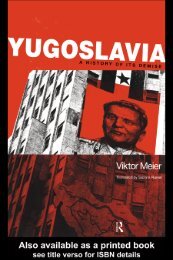Equality, Participation, Transition: Essays in Honour of Branko Horvat
Equality, Participation, Transition: Essays in Honour of Branko Horvat
Equality, Participation, Transition: Essays in Honour of Branko Horvat
Create successful ePaper yourself
Turn your PDF publications into a flip-book with our unique Google optimized e-Paper software.
xxvi Introduction<br />
though friendly, criticism, as he tried to keep the right balance between<br />
encouragement and critique.<br />
Throughout his life, <strong>Horvat</strong> has also been a political activist. Start<strong>in</strong>g<br />
from his partisan days, he has not rema<strong>in</strong>ed <strong>in</strong>different <strong>in</strong> front <strong>of</strong><br />
important developments on the political scene <strong>in</strong> his country. He was<br />
close to a number <strong>of</strong> critical social scientists <strong>in</strong> former Yugoslavia and<br />
with them participated <strong>in</strong> various <strong>in</strong>terdiscipl<strong>in</strong>ary research projects<br />
and discussions. He openly and usually very critically, sometimes provok<strong>in</strong>g<br />
major public controversies and strong reactions from <strong>of</strong>ficial<br />
politicians, raised his voice regard<strong>in</strong>g poorly designed <strong>in</strong>stitutional<br />
changes or major crises <strong>in</strong> Yugoslavia: for example, on the occasion <strong>of</strong><br />
the 1965 economic reform or the 1971 Constitutional amendments; or<br />
still later, <strong>in</strong> the early 1980s, motivated by the worsen<strong>in</strong>g <strong>of</strong> the crisis<br />
<strong>in</strong> Kosovo, he felt the need to <strong>in</strong>vestigate key problems <strong>in</strong> this region,<br />
which resulted <strong>in</strong> the publication <strong>of</strong> a book on the problem <strong>of</strong> Kosovo<br />
(Kosovsko pitanje, 1988).<br />
With the worsen<strong>in</strong>g <strong>of</strong> the political and economic crisis <strong>in</strong> Yugoslavia<br />
<strong>in</strong> the 1980s, <strong>Horvat</strong> became one <strong>of</strong> the harshest and most open critics<br />
<strong>of</strong> nationalism, its ideologues and political leaders. While strongly<br />
opposed to such political options, which <strong>in</strong> his view led to an undemocratic<br />
and overcostly resolution <strong>of</strong> the Yugoslav crisis, he actively tried<br />
to promote an alternative political agenda: a democratic reconstruction<br />
<strong>of</strong> Yugoslavia. Such activities, very much opposed by the prevail<strong>in</strong>g<br />
political climate, made him an active participant <strong>of</strong> numerous public<br />
debates.<br />
After the <strong>in</strong>troduction <strong>of</strong> multi-party democracy <strong>in</strong> Croatia <strong>in</strong> the<br />
early 1990s, he founded (and has been lead<strong>in</strong>g) a new political party,<br />
the Social Democratic Union, which promotes the concept <strong>of</strong> full<br />
democracy – <strong>in</strong>clud<strong>in</strong>g political democracy, social democracy and economic<br />
democracy – as one <strong>of</strong> its basic pr<strong>in</strong>ciples. However, he has left a<br />
much stronger impact as an outspoken critic <strong>of</strong> the course that transition<br />
and privatization <strong>in</strong> Croatia (and elsewhere) have taken, than as a<br />
leader <strong>of</strong> this rather marg<strong>in</strong>alized political party.<br />
<strong>Horvat</strong> has been, and rema<strong>in</strong>s, a controversial – for some, even<br />
eccentric – scholar, an economist beyond the ma<strong>in</strong>stream. Yet he has<br />
always been fully consistent as a theorist, and has rema<strong>in</strong>ed faithful to<br />
himself and to his ‘ideas and ideals’ which he defended throughout his<br />
rich and fruitful life. Be<strong>in</strong>g committed from his early youth to socialist<br />
values <strong>of</strong> economic and political democracy and social justice, he<br />
has never shied away from the normative side <strong>of</strong> economic theory.<br />
This comb<strong>in</strong>ation <strong>of</strong> rigorous reason<strong>in</strong>g and strong convictions place

















